When you think about the kinds of keywords you want your website to rank for, what do they look like? Do they describe the type of business you run, the products you sell or the location from which you operate?
Realistically, that’s where every keyword strategy starts.
But what about this thing called a branded keyword? Have you capitalised on it in your paid marketing strategy and, if not, are you missing an opportunity to reach a new (and perhaps more valuable) set of leads in search?
This post will explore:
- What are branded keywords?
- Who should use branded keywords?
- What’s the value in using branded keywords?
- How do you use branded keywords in marketing?
What Are Branded Keywords?
Non-branded keywords are what you would traditionally optimise a website for through SEO, though you can also bid on them via SEM advertising.
In this example, the keyword is “online bookstore”:
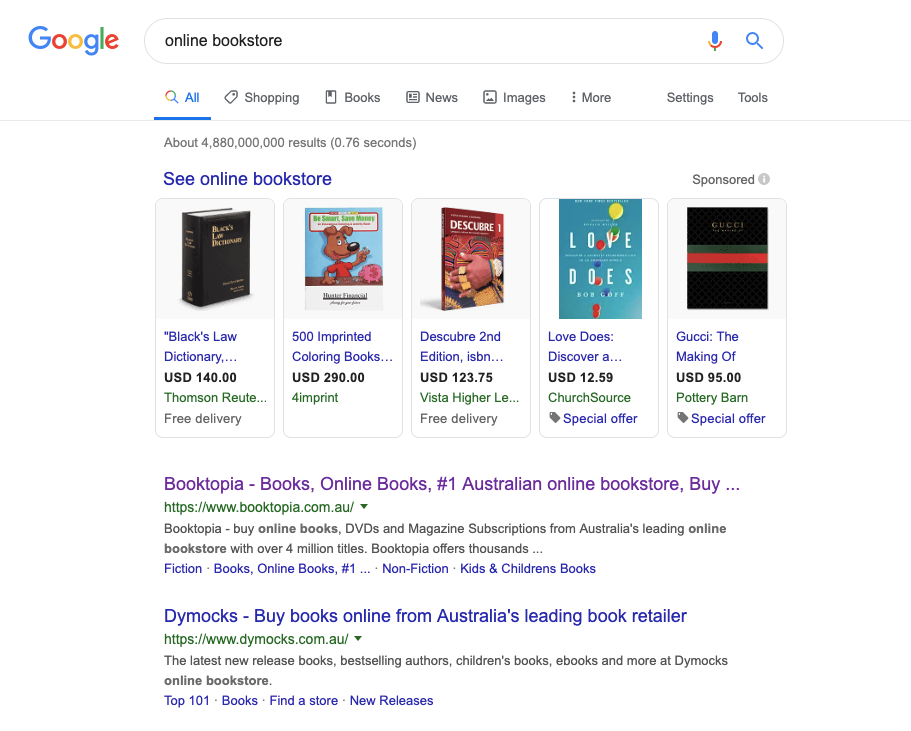
While there is a sponsored section of books for sale in this particular search via Google Shopping, the rest of search results are organic matches. That’s because non-branded keywords are descriptive of a thing, place or action, but remain mostly generic in nature so as to get a broad range of matching results.
Non-branded keywords are especially helpful for leads who are in the discovery and research phases. In other words, they put you in front of people who are otherwise unfamiliar with your company. They’re looking for a solution or answer you provide, but not for you specifically.
Branded keywords, on the other hand, are very specific. They either call out:
- A company name
- A public figure
- A URL
- A product name
- Or another trademarked entity
This is an example of a branded keyword search for “BridgeClimb Sydney”:
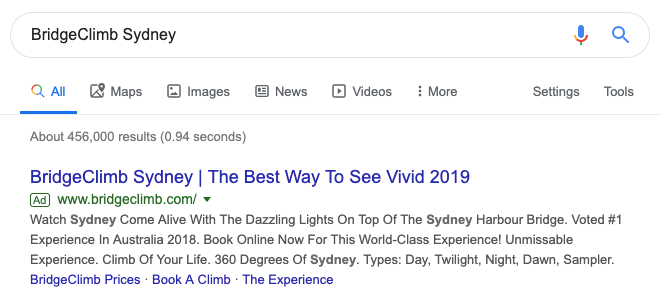
The very first thing shown on the search results page is a paid ad for BridgeClimb.
With branded keywords, you’re trying to reach people who already know your brand name or are familiar with something you sell. It’s really important to note this since the target searcher is usually in the later research and decision-making stages of your sales funnel when they use keywords like this.
Another thing to keep in mind about branded keywords is that they aren’t just the sole name of a business or product. You can create long-tail keywords for your branded entity, too. Using Google’s keyword planner, I’ve pulled a list of some possible long-tail keywords that would work for BridgeClimb:
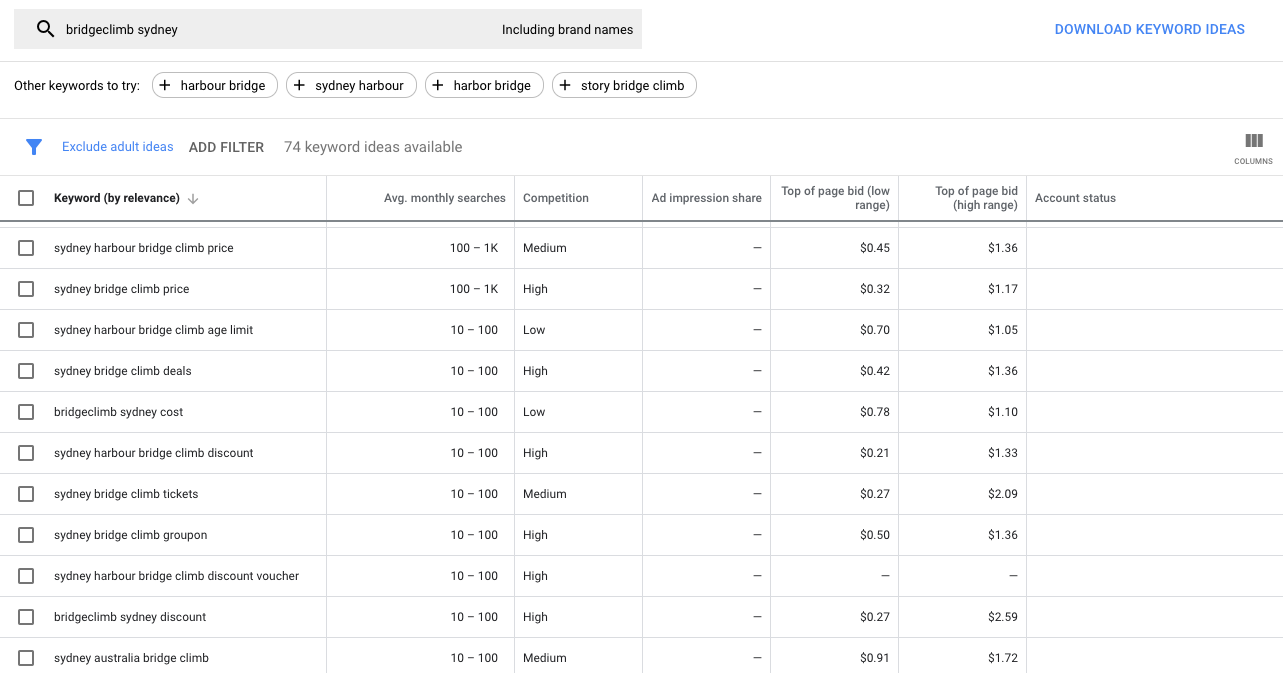
So, while the brand name alone can serve as a branded keyword, you can merge it with product names and categories, or words like “pricing”, “reviews”, “tickets”, and so on. These kinds of keywords are useful for getting prospects through the sales funnel since you’re providing a clear and instant pathway to conversion — and it’s sitting right there at the top of the Google search results.
Who Should Use Branded Keywords?
Your Google Ads campaigns need to be optimised for keywords. However, when should you start using branded keywords in your Google advertising strategy?
Let’s start with when it doesn’t make sense:
Don’t Use Branded Keywords If:
- Your business is brand new and has no search volume.
- Your CEO (or the face of your company) hasn’t made a name for herself or himself previously.
- Your products have never been released to the public before.
- You’re about to launch a new product that no one knows the name of.
In other words, if there’s little to no awareness or interest in the company, products or people behind the business, there’s no reason to use branded keywords.
Instead, you should focus on authority-building activities to get your company to that point:
- Create profiles for your brand online — Google My Business, social media, professional listings, etc.
- Strengthen your on-site and off-site SEO with non-branded keywords and other tactics.
- Publish more content to your blog.
- Get your CEO featured as a guest on high-authority blogs or podcasts.
- Ask product reviewers or influencers to feature your company or product.
- Write press releases.
- Work on growing a following and building brand-name recognition on social media.
Don’t Use Branded Keywords If:
- Your business is well-known. It doesn’t need to be known on a global scale, but your name should be recognisable to a worthwhile set of consumers.
- Your CEO is a significant figure in his or her space.
- You have a popular product or product line.
In other words, if people know your brand name, then you should be using it in your paid keyword strategy.
What’s the Value in Using Branded Keywords?
If you have a brand name worth leveraging in paid search, there is a whole host of benefits that come from doing so:
01.
Cost-Effectiveness
What’s especially nice about bidding on branded keywords is that they’re usually much cheaper than the non-branded keywords you go after. That’s because there’s less competition for your brand name as a keyword (though that doesn’t mean there’s no competition — see below).
If you have people searching for your brand name, it may be a wise investment to bid on those keywords, even if you are ranking for them organically.
02.
Dominate Search
You can use branded keywords in both your organic and paid search marketing strategies. For example, you can see that Atlassian takes the top paid result and the top organic result in this branded search:
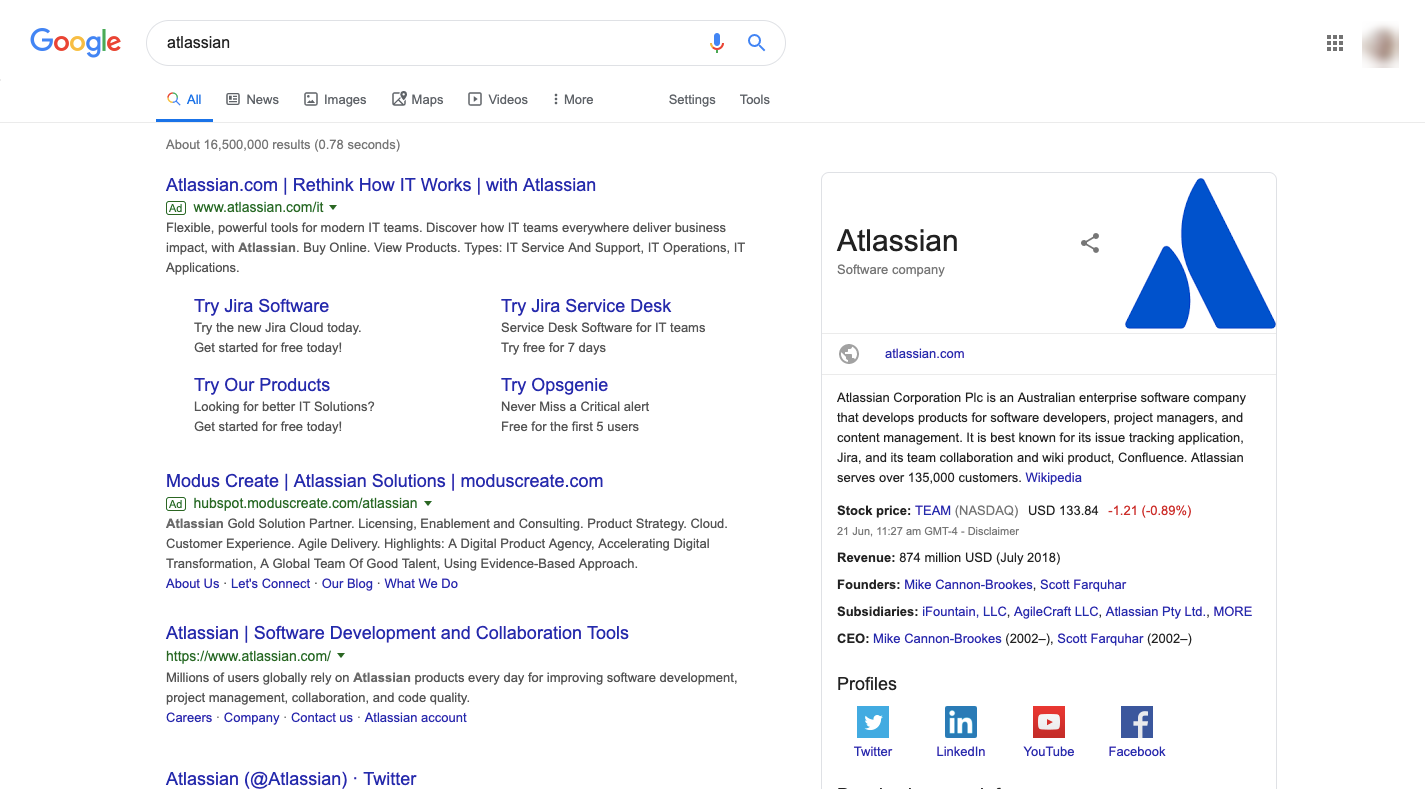
Imagine what a prospective customer would think if they saw this type of authority and dominance displayed on Google’s first results page for “Atlassian”.
Now, if Atlassian were a local company, it could use Google’s free business listing service, Google My Business, to fill the knowledge graph with details about the business. Instead, because Atlassian is a global product, the knowledge graph is filled with details from sources like their high-authority social media profiles, Wikipedia and even the structured data on their website.
03.
Control Your Message
Branded keywords aren’t just valuable for getting your already-known company or products to the top of search. You can leverage your trusted name to announce product launches, upcoming sales events and new location openings. You can also use it to make the transition from an old brand name to a new one more seamless.
Take this example from TourRadar:
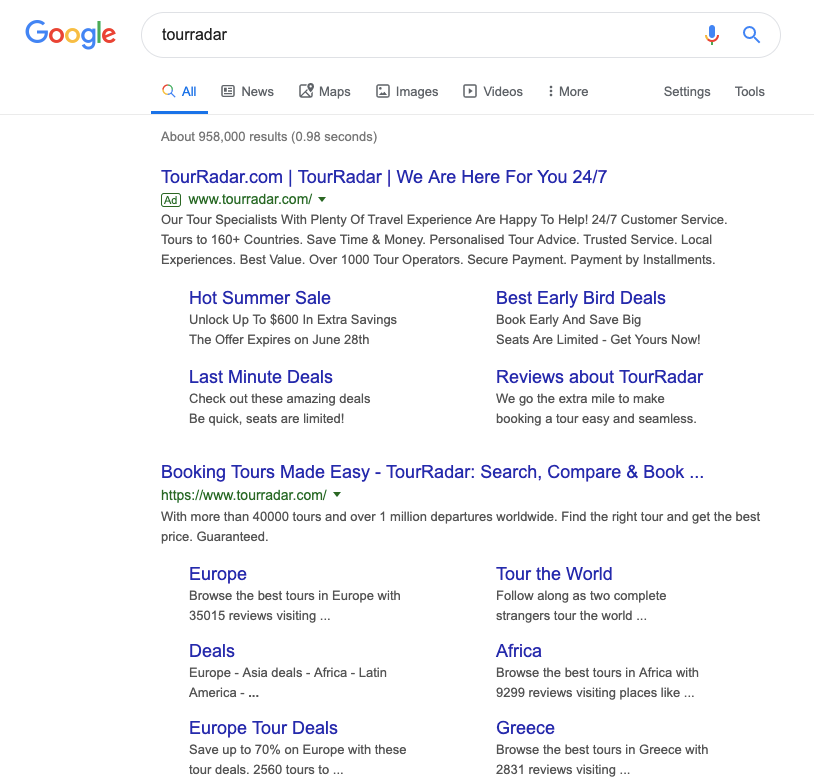
Note how different the messages and site links are for the paid and organic search results.
With an organic branded search, users are going to see the metadata you directly entered into the page (or sometimes, whatever the search engine deems to be more relevant). However, with a paid branded search, you have much more control over what appears.
In this case, TourRadar has taken this opportunity to highlight a list of benefits in the page description. Then, the site links promote a very timely announcement of the company’s summer sales event. This way, people searching for TourRadar aren’t left to retrace their footsteps through the website, trying to figure out what to do next. There’s a clear call-to-action built into the paid search listing.
04.
Bottom-of-the-Funnel Marketing
There is a stark difference between not only the kinds of results that display, but also how they appear in non-branded vs. branded searches. Let’s use the example of “money transfers Australia”:
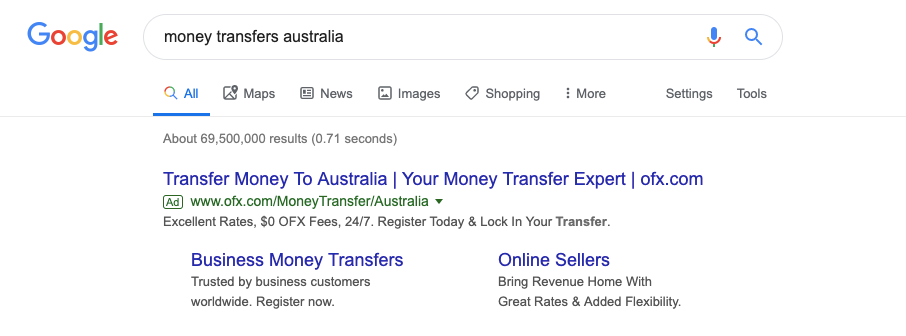
Someone doing a search like this is either looking to transfer money online or to maximise how much money they bring into their business. They don’t have anyone specific in mind; this is more of a fact-finding mission which puts them at the top of the sales funnel.
Because they probably have a long way to go before they convert, the non-branded ad has been designed to be more educational in nature.
Compare that to a branded search for “OFX”, the company that appeared in the non-branded search above:
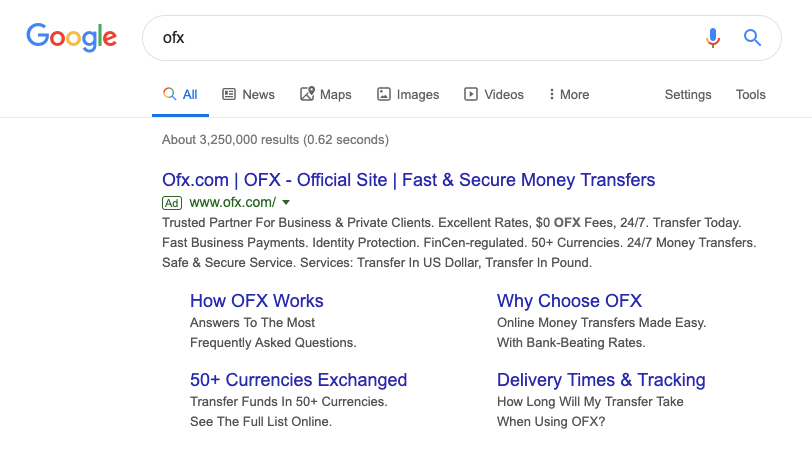
The Google Ad is for the same exact money transfer company. However, because the search intent varies from a non-branded search, the resulting ad greatly differs. In this case, there’s no need to make the prospect work for it. OFX directs prospects to pages that will get them the final answers they need before conversion.
05.
Invade the Competition
What’s interesting about the Atlassian example above is that you can see that a partner company (Modus Create) has also leveraged the “Atlassian” keyword in Google Ads.
There’s nothing in Google’s guidelines that says you can’t hijack branded keywords from the company they belong to. I suspect that Atlassian wouldn’t have a problem with a partner (who pays them affiliate commission, I’m sure) ranking just beneath their ad for their branded search term. That said, if a competitor of Atlassian were to do the same, and were to use Atlassian’s name in its ad, that would give them a case for trademark infringement.
Bottom line: Be careful if your goal is to piggyback on top of your competitor’s well-known name (whether it’s trademarked or not). They could easily flip the script when you build enough authority of your own. Then, you’ll end up having to outbid them to rank in the top spot for your own branded keyword.
In addition, you might not want to hitch your brand to another’s in search. It could become difficult to differentiate between your lookalike brands, leaving consumers to go for one that stands apart from the two of you. Instead, focus on building up your own brand authority so that bidding on your branded terms becomes a valuable investment.
How Do You Use Branded Keywords in PPC Advertising?
Once you’ve confirmed that people are searching for your brand name (do this in Google Ads Keyword Planner, Google Search Console, or any SEO tool really), then you can start using those keywords in your paid marketing strategy.
Branded keywords are a good choice for pay-per-click marketing since they’re relatively cheap and you know the likelihood of visitors clicking on your ads and converting from them is high.
Just make sure that your ads really stand out.
- Take time to write messaging and offers that appeal to those bottom-of-the-funnel leads.
- Include ad extensions that make your listing really pop with things like a phone number, pricing, operating hours, links to relevant pages, and so on.
- Link to landing pages where visitors have to take the fewest steps to convert.
As for wording your PPC ads, your goal is to make a sale. They’re already aware of who you are, so don’t waste time pointing them to informative services pages or reiterating what your company does. Make the offer so appealing that they have to take action.
Wrap-Up
While there is great value in using branded keywords in pay-per click marketing, don’t forget about the rest of your search marketing strategy. To make the most of it, use a combination of organic search marketing, pay-per-click marketing and local search marketing. Then, weave in both branded and non-branded keywords so you can attract visitors from different parts of the sales funnel, top and bottom.
With this kind of broad keyword strategy, you’ll cast the widest net and see the best outcomes.
If you’ve read this and feel like, “Hey, that’s a great idea, but I’m not sure if my business is ready just yet”, schedule a discovery session with SIXGUN today. We’ll review your website and data and help you find the best keyword strategy for your business.
Hero Image Source: Pixabay




